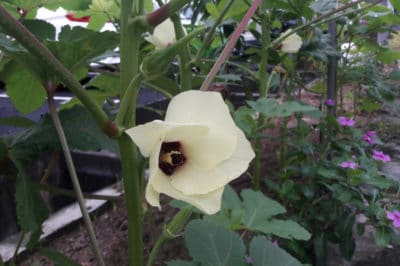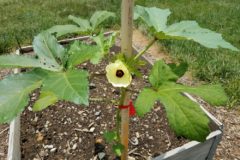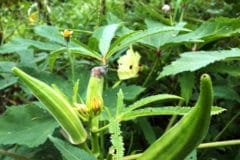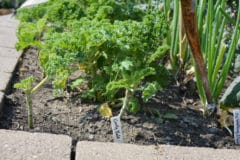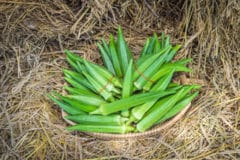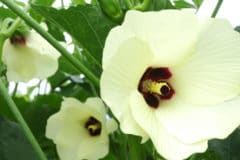Okra’s Companion Plants
Okra’s companion plants include:
- Peppers
- Tomatoes
- Beans
- Radishes
- Lettuce
- Catnip
- Basil
- Nasturtiums
You could include sunflowers and other flowering plants on that list because having flowers planted in and around your garden draw pollinators and insects like hoverflies, tachnid flies, green lacewings, and trichnogramma wasps. These latter beneficial insects have larva that prey on the eggs and caterpillars of the insect pests in your gardens and, in some cases, on the insects themselves.
Okra’s Pest Protection
When plants attract the same pests, it can be both a detriment and a benefit. It’s a detriment because these plants draw those insect pests to your garden. However, it can be a benefit because you can use one of those plants to lure those pests away from the other.
Stink bugs, for example, love okra, tomatoes, peppers, and beans. Because just one okra plant can produce so many pods, you might only have planted four or five, or you might have planted 25 or more because you’re trying to preserve a particular variety of okra.
In either case, you will probably want to protect your okra. You might also want to protect your peppers and tomatoes, but you might be willing to let the stink bugs have a few of your beans to lure them away from your okra, tomatoes, and peppers.
Flea beetles love okra as much as stink bugs do, but they, too, are fickle. They can be lured away by the temptations of radishes and nasturtiums.
Other plants repel insect pests. While stink bugs love peppers, cabbage loopers hate them enough to avoid okra if you intersperse your okra with pepper plants, but you have your beans to lure the stink bugs from both your peppers and okra.
Flea beetles also like okra, but they are repelled by basil and catnip. After the catnip and basil discourage flea beetles from coming near your okra, you can lure them to another part of your garden with nasturtiums. Radishes also lure flea beetles from your okra, but, as with peppers, there’s a reason you might want to intermingle radishes and okra.
Improving Soil Conditions
Okra can grow in many soil types, but it prefers loamy, sandy soil that’s rich in organic materials. Peas enrich the soil with nitrogen as they grow, so rotating crops of peas and okra and planting peas near your okra are both good ideas.
Radishes improve soil conditions in a different way. When radishes are planted between your okra plants, the bulbs and roots break up the soil, making it easier for okra to sink its taproot deeper into the ground. If you have heavy clay soil rather than loamy, sandy soil, having radishes to break up the soil for okra’s taproot is particularly helpful.
While both okra and radishes attract flea beetles, the radish leaves are closer to the ground. The okra leaves will be much higher, especially if you remove the lower leaves to encourage pods to grow higher on the plant, so the flea beetles may be more inclined to settle for the radishes.
Okra Pays the Benefits Forward
Once summer heats up and okra has its growth spurt, it provides shelter for shade-loving plants with shallow root systems like lettuce. You can plant many shade-loving plants near your okra.
Plants That Don’t Mix Well With Okra
Some plants don’t grow well around okra for the same reason that lettuce does – the shade. Okra grows tall and wide, so plants that want to be in the full light of the glorious sun won’t grow well standing in okra’s shadow. Okra can’t blame them for that, because okra likes that glorious sun, too.
